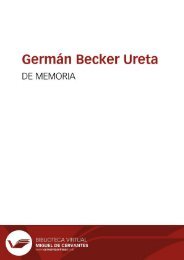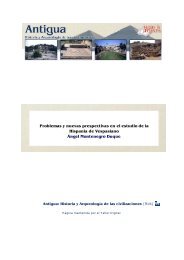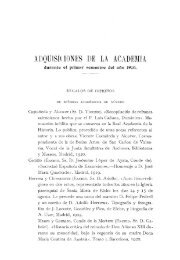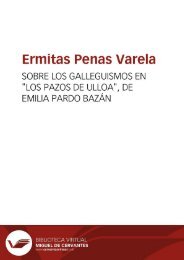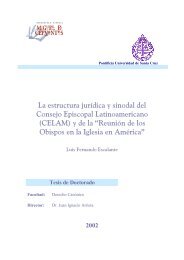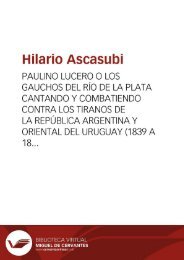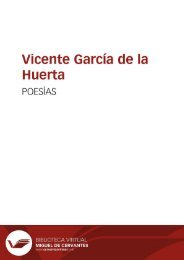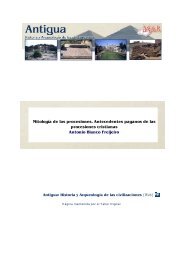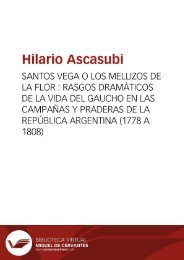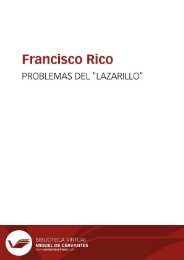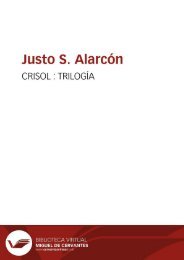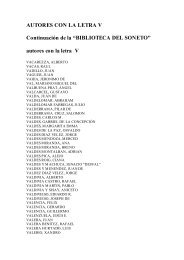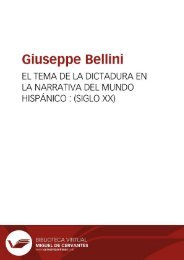You also want an ePaper? Increase the reach of your titles
YUMPU automatically turns print PDFs into web optimized ePapers that Google loves.
Anales galdosianos [Publicaciones periódicas]. Año XII, 1977<br />
« Caifás », « Pecado », « Demonio », « purgatorio ») adds: « Tiene más malicias que un<br />
Iscariote » (p. 1002 a ). And when he is finally allowed to leave for lunch, she examines his clothing<br />
for rips and upon finding one exclaims: « Ya me has roto los calzones... [Tunante, ya verás, ya verás]<br />
Ya verás, Holofernes, ya verás » (ms. p. 98; OC p. 1002b). And in the final scene of Chapter III<br />
between Isidora and Encarnación the references multiply. The Sanguijuelera opines that it would<br />
have been far better for all concerned had Isidora and Mariano never been born: « Nada habría<br />
perdido el mundo con que os hubierais quedado por allá... en el Limbo » (P. 10003 b ). When Isidora<br />
denies that Rufete and Francisca Guillén were her parents, Encarnación retorts: « Justo, justo, mi<br />
Francisca, mi ángel os parió por obra del Espíritu Santo o del Demonio » (p. 1004a). The old woman<br />
sarcastically invites her great-niece to continue the melodramatic version of her birth and Mariano's:<br />
« Pero acábame el cuento. Salimos con que [eres hija] sois hijos [de mi sobrina Paca] del nuncio...<br />
» (ms. p. 105; OC p. 1004 a ). And when Isidora insists on believing the Canónigo's absurd account<br />
of her birth, to the Sanguijuelera 's contemptuous astonishment', the old woman exclaims: « No sé<br />
sino que te caes de boba. Eres más sosa que la capilla protestante » (p. 1004 a ).<br />
Certainly these religious references are proper to the character of a hardworking lower-class woman,<br />
which is perhaps why they pass almost unnoticed at first. But these Biblical and otherwise religious<br />
references are not local color; they are too carefully inserted to be coincidental. Encarnación uses<br />
them because she is a prophetess, and at the end of Chapter III she will make a prophecy to Isidora and<br />
the Spain she represents. The narrator summarizes the Sanguijuelera 's character a moment before<br />
the prophecy: « Honradez y crueldad, un gran sentido para apreciar la realidad de las cosas, y un rigor<br />
extremado y brutal para castigar las faltas de los pequeños sin dejar por eso de quererles, componían,<br />
con la verbosidad infinita, el carácter de Encarnación la Sanguijuelera » (pp. 1004b-1005a). With<br />
the groundwork thus laid and Isidora cowering at her great-aunt's feet, the Sanguijuelera predicts the<br />
course of Isidora's life and the natural outcome of her pretension to a position in the Aransis family:<br />
« ¡Toma, toma, toma, duquesa, marquesas, puños, cachas!... Cabeza llena de viento... Vivirás en las<br />
mentiras como el pez en el agua y siempre serás una pisahormigas... Malditos Rufetes, maldita ralea<br />
de chiflados... » (p. 1005 a ).<br />
It is too soon, however, for <strong>Galdós</strong> to announce his intention openly and give the ending away, so<br />
he retreats, using a religious reference ironically in order to undo the effect of all the serious religious<br />
references that have gone before. The narrator comments at the end of Encarnación's harangue: « Y<br />
cada palabra era un golpe y cada golpe un cardenal leve (es decir, subdiácono)... » (p. 1005 a ).<br />
Suddenly an uncertainty exists: are we witnessing the vision of a prophetess or the temper tantrum of<br />
31



